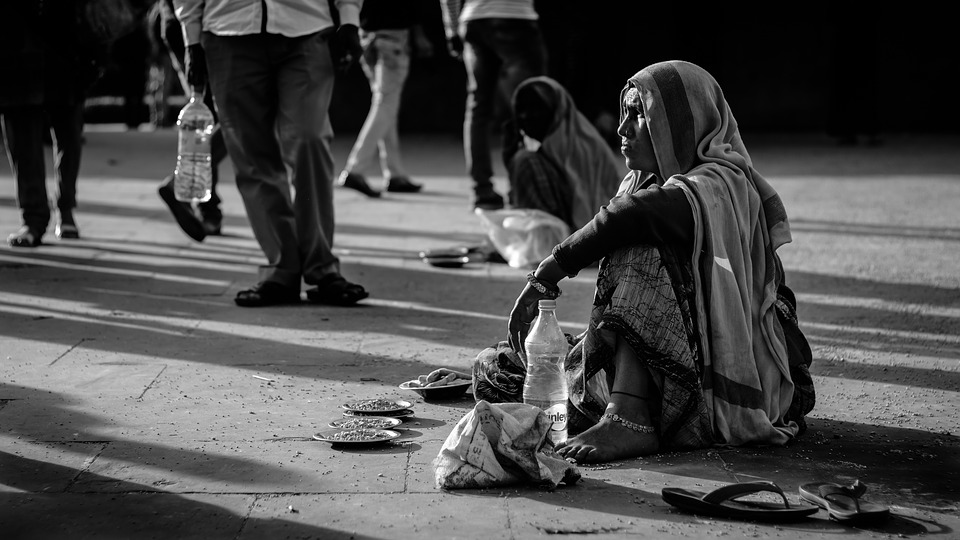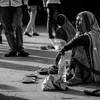clear

source:
No picture
The percentage of the world's population living in absolute poverty has dropped radically over the 20th and 21st century. But is an end to poverty in sight?
Given the world's wealth, the eradication of poverty seems attainable. Unfortunately there is one major impediment to this ever happening. Human nature. It seems inherent that the more wealth humans have, the less likely they will want to give up even a portion of it.
Poverty itself is difficult to define. Someone living in a sink estate in England may justifiably regard themselves as living in poverty, but not when compared to a Sudanese child who spends several hours each day collecting drinking water. The United Nations Food and Agriculture Organization defines poverty in terms of diet. In their annual report last year they estimated, of the total world population of 7.3 billion, around 795 million were chronically undernourished, equating to one in nine. The UN have also adopted an ambitious target of ending extreme poverty by the year 2030. Progress has been made – poverty among the developing world has been halved since 1981. But there are still immense hurdles in the way of this 13-year plan. About a billion of the world’s extremely poor live in China. And in Sub-Saharan Africa, beset by famine and endless wars, the figures for those in poverty have actually increased since 1981.
Western nations must continue to commit to bolstering more troubled economies through international aid. Although far-right politics balks at this transfer of money, countries like the UK and France have a moral obligation to support the former colonies they once so enthusiastically stripped of assets. 2030 is a bold target. Global poverty may well be dented. It seems ridiculously optimistic to think of it being eradicated.
 1
1
clear
We are as close to eradicating poverty as we wish to be. When I say 'we', I refer to those of us - which is most, myself included - who are complicit in supporting a system of intentional inequality such that half the world's wealth is owned by 8 men. How can that be defensible? What possible need does one person have to possess wealth that could support billions, and use it for their own gain? There is no possible defence for a system that means so few control so much, and so many live in squalor. So I conclude that we are more motivated by complacency to maintain a staus quo that results in starvation, disease, and reduced life expectancy...than we are to declare such an arrangement as wrong and act to change it. And that means, despite what valuable work is being done around the edges, the corrupt and evil heart of the culture we live in continues to perpetuate itself - and poverty will continue as long as that is the case.
 0
0
clear
Eradicating poverty in all its forms and dimensions, including extreme poverty, is the greatest global challenge and an indispensable requirement for sustainable development.
The 2030 Agenda for Sustainable Development resolves to free the human race from the tyranny of poverty and to heal and secure our planet.
The first Sustainable Development Goal aims to “End poverty in all its forms everywhere”. Its seven associated targets aims, among others, to eradicate extreme poverty for all people everywhere, reduce at least by half the proportion of men, women and children of all ages living in poverty, and implement nationally appropriate social protection systems and measures for all, including floors, and by 2030 achieve substantial coverage of the poor and the vulnerable. Priority actions on poverty eradication include: • improving access to sustainable livelihoods, entrepreneurial opportunities and productive resources; • providing universal access to basic social services; • progressively developing social protection systems to support those who cannot support themselves • empowering people living in poverty and their organizations; • addressing the disproportionate impact of poverty on women; • working with interested donors and recipients to allocate increased shares of ODA to poverty eradication; and • intensifying international cooperation for poverty eradication.
 0
0
clear
I think society failed to eradicate poverty by implementing doomed poverty eliminating policies. State reformers who treat poverty as merely economic problem and provide state welfare to eliminate it,but instead they discourage people in poor areas to get involved in any activities and just spend public funds. This approach would just increase a share of irresponsible people in a society because people would learn that as soon as they are considered poor they would be rewarded by the state. It is important to understand that poor people need to be encouraged and taught to provide for themselves and compete with everyone else. Otherwise they will be misusing welfare money.
Social entrepreneurship and microfinance are great tools helping out to eradicate poverty. According to this approach small teams need to be formed in a community, and through a combination of training, support and a small loan these teams are gradually becoming self-sustainable. Technological development is really helpful in this respect as people from richer countries could establish and implement social entrepreneurship projects in poor regions in other parts of the world with the help of various online tools.
 0
0
clear
 Olga www.facebook.com/olga.terenetska
6 years, 2 months ago
Olga www.facebook.com/olga.terenetska
6 years, 2 months ago
If one takes the stance that poverty isn't possible, trying to eradicate it just becomes self-defeatest. By attacking poverty one creates divide, and one creates the condition for hostility and riot and violence
Instead of rich and poor, it's better if people are just known as planets and galaxies
 0
0
clear

 AdrianR
AdrianR
